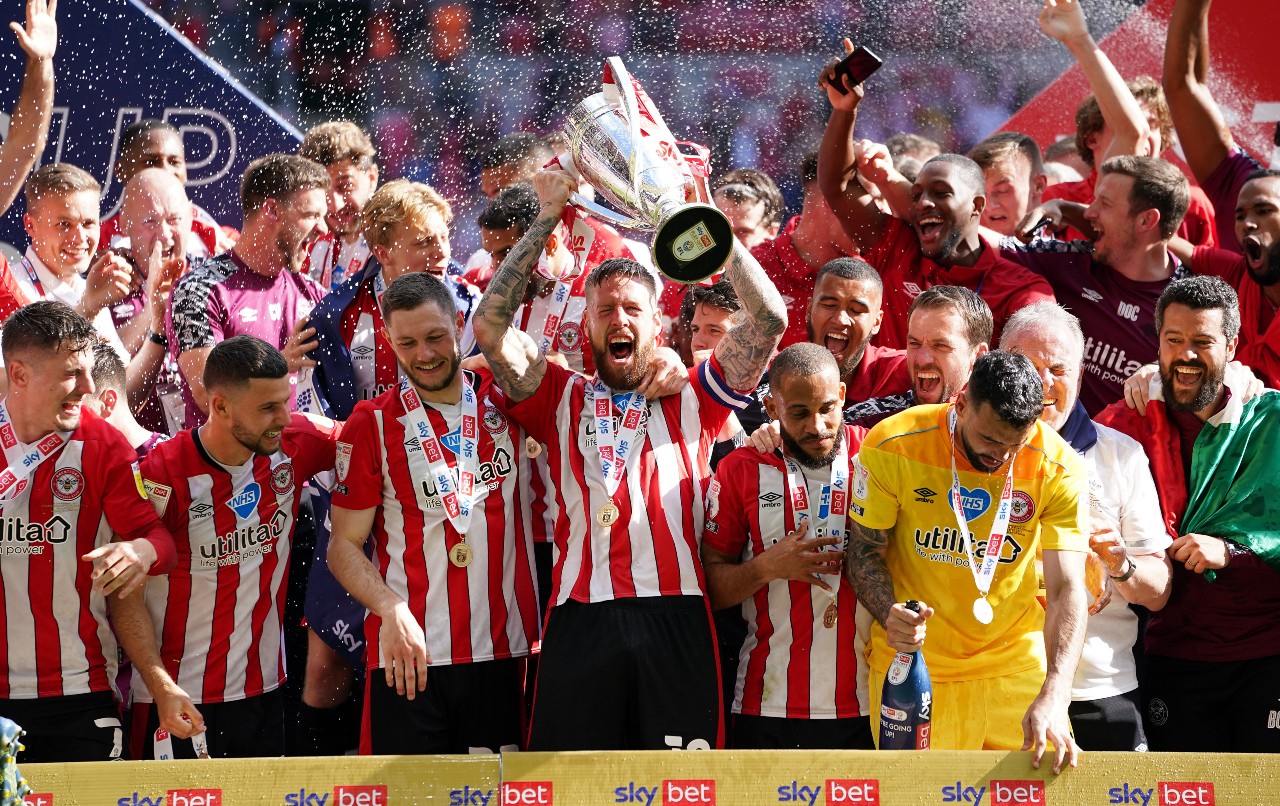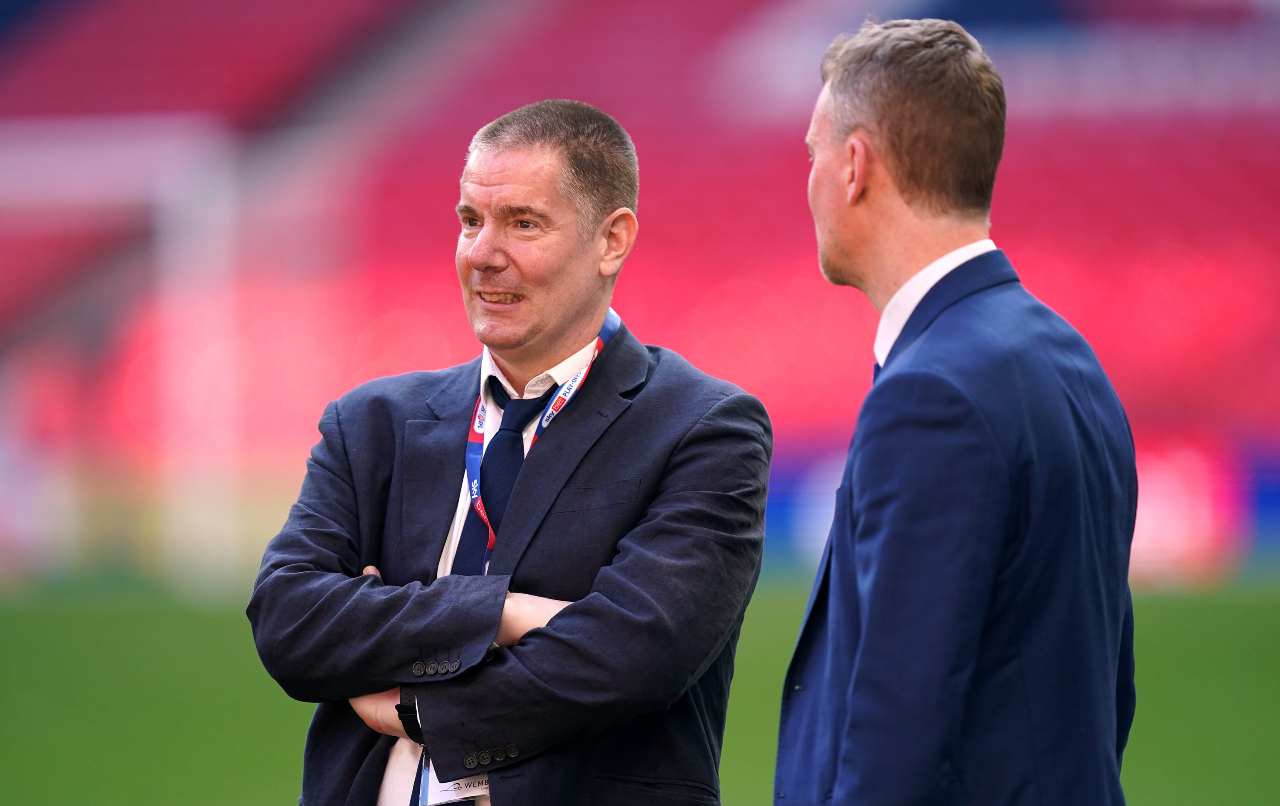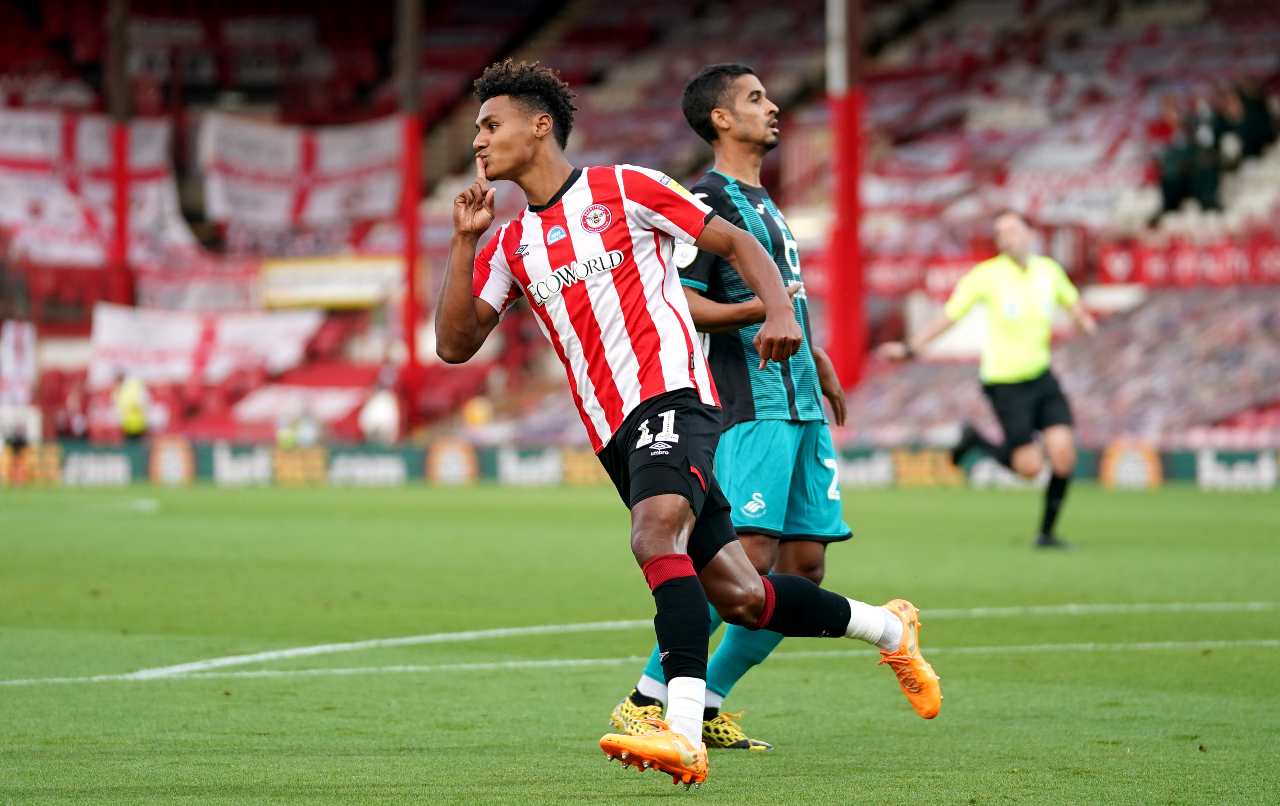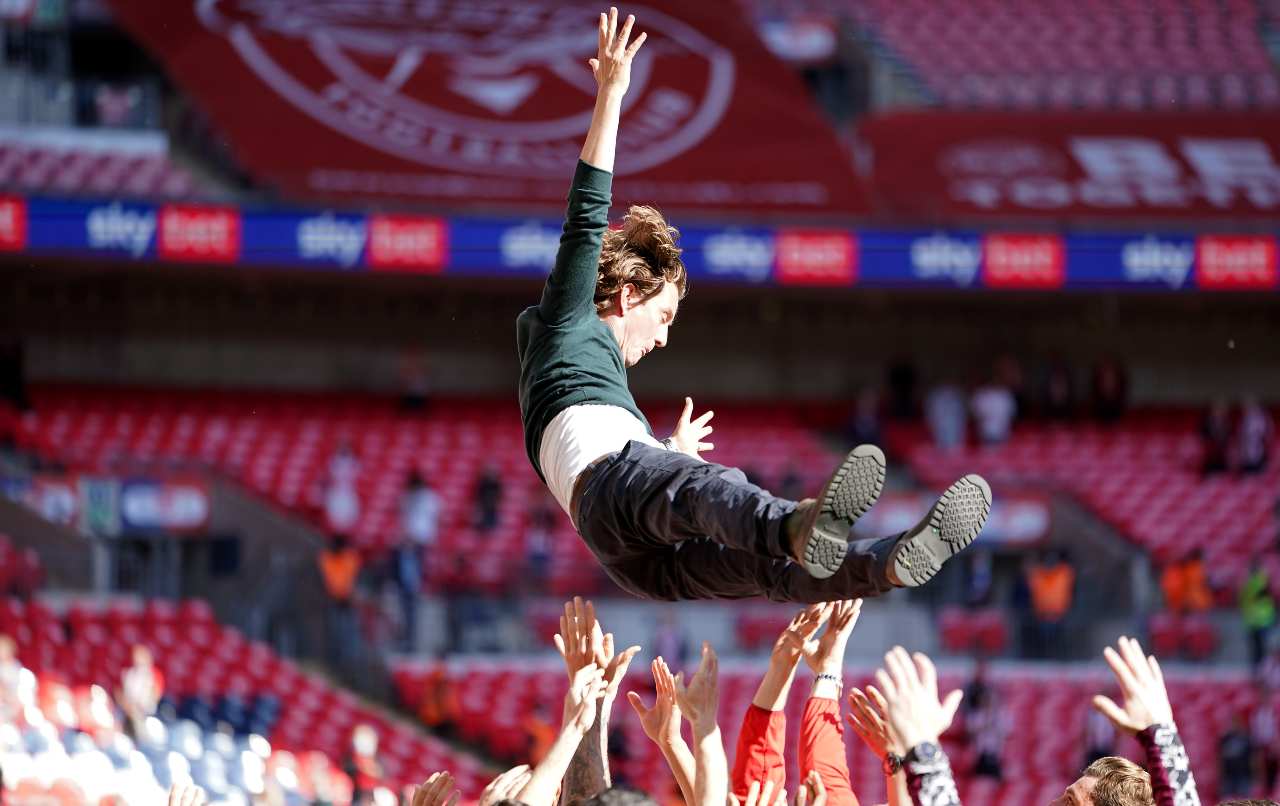Brentford back in the Premier League: how the Bees' Moneyball philosophy overcame play-off heartbreak to make it back to the promised land
Brentford’s journey from League Two to the Premier League has featured controversial innovation, penalty chaos and enough play-off heartbreak to last a lifetime. Bees heroes past and present tell FFT how they did it...

This feature on Brentford's Premier League return first appeared in the August 2021 edition of FourFourTwo.
Order the new issue with free delivery here – just select 'Season Preview 2021' from the dropdown.
Subscribe to FourFourTwo today and save! You'll get 13 issues per year...
Nine times Brentford had been in the play-offs. Nine times they’d lost. Thomas Frank wasn’t prepared to let it become 10.
Tranmere, Huddersfield, Crewe, Stoke, Sheffield Wednesday, Swansea, Yeovil, Middlesbrough, Fulham. All had ended the Bees’ dreams of glory over the past 30 years.
Frank had stood disconsolately on the touchline at Wembley for the latter of those nine occasions last August, as manager of a Brentford side denied their first promotion to the Premier League. An automatic spot had been snatched away on the last day of the Championship season, then came defeat to rivals Fulham in the play-off final. “It was like an open wound, it was extremely painful,” the Dane tells FourFourTwo now. “It was a driver for the unbelievable season we had after that.”
Nine months later, Frank stood on the same Wembley touchline, managing Brentford to a play-off final victory at last. “Joy in its purest form – I can only compare it to when I became a father three times,” is how he describes the final whistle that May afternoon against Swansea, their Premier League ambition finally realised. “Now, the wound has healed. In hindsight, it’s good to have experienced both sides of that game. You appreciate it more.”
Get FourFourTwo Newsletter
The best features, fun and footballing quizzes, straight to your inbox every week.
Frank’s story is Brentford in microcosm. Ever since 2007, the Bees have experienced no shortage of setbacks: key games lost, a litany of key players departed. Yet through it all, they have kept marching forward, from the lower reaches of League Two all the way to the top flight.
In the most innovative of fashions, they made history – not by outspending their rivals, but by out-thinking them. No football club in England has progressed quite so relentlessly in recent years – probably because no other club is quite like Brentford.
The crossbar challenge
Fourteen years ago, things looked bleak for the Bees, who were struggling in League Two when Terry Butcher departed as manager. “We were awful and on the edge of going to the Conference – our football was so bad,” lifelong fan Billy Grant tells FFT.
For much of the previous decades, Brentford had been well down the London pecking order – below Arsenal, Chelsea, Tottenham, West Ham, Fulham, Crystal Palace, QPR, Charlton, Wimbledon and Millwall. Griffin Park was crumbling. They narrowly avoided administration in the early 2000s – supporters’ trust Bees United stepped in, but finances were still limited.
Slowly, though, a figure of hope started to emerge. Matthew Benham didn’t seek the limelight, but was a lifelong fan who’d quietly helped to fund Bees United, then took over £3m of the club’s debts. When Brentford reached their nadir in the fourth tier, he was already helping to stabilise them financially and turn the ship around.
“He was an unknown quantity,” Grant explains. “People would say, ‘I’ve heard this guy has put money in, and I’ve heard he stands on the terraces, but I’ve no idea who he is.’ I met him a few years later on the terraces – he was with a friend of mine, Radiohead’s manager, who said, ‘This is my next-door neighbour, Matthew’. We started chatting, then I realised – I said, ‘Are you Matthew Benham?’ He keeps himself to himself but he’s a hardcore Brentford fan, a really nice bloke.”

Having made his money via his SmartOdds firm, which offers statistical information to professional gamblers, Benham started to invest in the club on a regular basis. Brentford climbed out of League Two and into the top half of League One, then Bees United opted to sell him their shareholding and let him take things on even further.
But then came their most famous setback. On the final day of the 2012/13 season, Brentford hosted promotion rivals Doncaster at Griffin Park – a golden opportunity to reach the second tier, where they’d been for only one of the previous 60 years. Doncaster needed a draw to go up automatically, while Brentford – playing a new brand of attractive football under the management of Uwe Rosler, working alongside sporting director Mark Warburton – had to win.
In the fourth minute of stoppage time, the Bees were awarded a penalty. Captain Kevin O’Connor was the designated taker, but 20-year-old Marcello Trotta grabbed the ball, certain he could secure promotion. “I was confident, so I thought, ‘OK, I’m going to take it’,” the striker tells FFT from Italy.
What happened next became one of the famous incidents in recent EFL history. “The ball cannoned off the crossbar, before Doncaster ran down the other end and scored. All our players just collapsed on their backs. It was horrible,” Grant remembers.
There were just 18 seconds between Trotta’s miss and James Coppinger’s goal, ending Brentford’s automatic promotion hopes in the most agonising fashion. As they’d done many times before, they lost the play-offs, beaten by Yeovil Town in the final.
“When I watch it now, I think, ‘I didn’t need to shoot that hard’ – but I was young,” Trotta says. “It was a sad day.” The striker struggled to sleep for days afterwards. “I always had the same picture in my mind: the penalty, the crossbar,” he explains. “But the manager phoned me the day afterwards and said, ‘Don’t worry.’ The sporting director, too. I was 20 and everyone helped me a lot.”
Trotta had been on loan from Fulham, but Brentford’s culture of unity persuaded him to return for the next campaign. “I thought, ‘I have to do it for them, they deserve something good – I missed the penalty so I have to go back’,” he says.
The Italian scored 14 goals that season as Brentford bounced back from their heartbreak to secure automatic promotion with three games to spare. “It was a relief,” admits Trotta, who has since played in Serie A with Sassuolo and Frosinone, but has followed his old club’s progress. “I thought, ‘OK, I made a mistake, but this year I did my job and everyone is happy’. I closed the circle in the right way.”
Rosler had left for Championship club Wigan midway through that campaign – Benham surprisingly handed the job to Warburton, who’d never managed before. “We were all at Hounslow town hall for the vote on our new stadium when we heard the news about Rosler,” Grant says.
“I worried it could scupper us. He was the one who changed our style of football – he wanted to pass teams to death, which was strange for us. Fans would shout, ‘Get it up there!’ After a year, though, we were saying it was the best football we’ve ever seen. When Warburton was appointed, people thought, ‘Who is this bloke?’ But Matthew Benham doesn’t necessarily believe in big names. He believes in people who can do the job.”
Show me the Moneyball
The Bees shocked everyone in their first Championship season, finishing fifth before falling short in the play-offs.
“Teams couldn’t live with the way we passed and moved,” says midfielder Alan Judge, who spent five years at the club. “They mentioned their Premier League ambition when I first signed in League One. Back then, I told someone I’d signed for Brentford and they said, ‘Who?’ But I played the best football I’ve ever played there. We were a free-flowing team.”
Despite that, by February of that first season in the Championship, it was controversially announced that Warburton would be leaving at the end of the campaign. He had the highest win percentage of any manager in Brentford’s history, but the club wanted to go in a different direction.
There’d been a difference of opinions between Warburton and Benham over January signings – the owner knew Brentford couldn’t sustain their success within FFP rules, unless they changed their recruitment process to incorporate the statistical modelling he’d developed in his business, using it to find talented but cheap players who’d been overlooked elsewhere.
A club statement was released, explaining the plan to use mathematical modelling to identify recruits and confirming that Brentford would have a head coach rather than a manager from now on, unable to veto signings. The statement drew derision from much of the football world, and some of the club’s own fans.
It earned Brentford the label of the ‘Moneyball’ club, emulating the statistical recruitment methods that allowed the Oakland Athletics to achieve success on a budget in Major League Baseball. There were undoubtedly some similarities, but it’s a tag Benham has never been entirely comfortable with. While data is used heavily, Brentford have also never underestimated the importance of the human eye.
“The owner regretted that club statement,” explains Phil Giles, the club’s co-director of football. “But sometimes it’s better to be known for something rather than nothing. Brentford are known for Moneyball and stats – some elements are fair enough, some get a bit overblown. But that’s my background.”
Giles had worked as a quantitative analyst at SmartOdds and joined Brentford in 2015, when Warburton and previous director of football Frank McParland departed. Also arriving was Rasmus Ankersen, chairman of Danish side Midtjylland – the club Benham bought in 2014 and has since helped to their first three domestic titles.

The fact that Brentford have two directors of football, when many clubs have none, says much about the importance placed on off-field organisation. The Bees have an ethos, style of play and methodology that goes way beyond the identity of the current head coach. They were using their own more detailed version of xG before the term started to become mainstream, looking for every indicator possible that performances were on the right track.
“We’re not the only club that use stats,” Giles insists. “But you use them from a tactical perspective, to analyse your own strengths and weaknesses in certain phases of the game, to assess physical performance, and also the recruitment side.
“The challenge is getting as much information on players as possible. You could watch a player once at the Euros and think he’s good, but what’s his true level? One way is to get lots of data, without having to watch 1,000 hours of footage on every player. A lot of the metrics you see are things like pass completion, but on-the-ball data is only two percent of what a player does. You want information on all aspects of the game.
“Because of Matthew’s background and mine, maybe that was our competitive edge. We had to say, ‘What can we be really good at?’ We could try to play like a Neil Warnock team, but he’s going to beat us at that. In the first three years I was here, we were probably in the bottom six to eight clubs in the Championship in terms of budget. Our income was definitely bottom – Griffin Park had the worst revenue of all clubs, so we had to sell players to subsidise that.
“Over the past three years, we were maybe eighth to 16th for budget, because we focused on developing young players and selling them on for good money. We wanted to play attacking football, too. If you want to sell players, strikers who are scoring goals are going to be worth money.”
The implementation of that methodology wasn’t without bumps in the road. Dutch boss Marinus Dijkhuizen was brought in to replace Warburton, but it didn’t work on or off the field and he was sacked after nine games. Things have been more stable on the coaching front since, but every time it looked promising, Brentford had to sell another star man and find a way to cope without them.
Jota, Andre Gray, James Tarkowski, Stuart Dallas, John Egan, Chris Mepham, Neal Maupay, Ezri Konsa, Ollie Watkins and Said Benrahma have all been sold in recent years – so it’s even more impressive that Brentford hovered between ninth and 11th for four seasons in a row, largely under Dean Smith.
“People said Brentford would never go up because we kept on selling our best players,” Grant explains. “Initially, when we sold a player, fans would get angry. By the third one it was, ‘Alright, it’s fine!’ We understood that they knew what they were doing.”
To be Frank
Brentford also made a significant addition to their backroom staff, bringing in former Brondby boss Thomas Frank as assistant head coach. “He was a brilliant coach, tactically very good,” Alan Judge remembers of his time working with the 47-year-old.
As Frank himself explains, “I knew Rasmus Ankersen from Denmark, but when he offered me the assistant coach role I wasn’t sure. I wanted to be a head coach, but I’d heard about Brentford, and it suited me. We could maybe out-think bigger clubs.”
Frank also implemented the first team’s style of play on the club’s new B team, set up in 2016 in place of the Bees’ academy. Benham believed it was a cost-effective way of producing players for the first team, with a clearer pathway for emerging talent.
Technical director Robert Rowan was making the B team a success, when he suddenly passed away from heart failure in November 2018, aged just 28. It rocked the club.
“It was a massive shock,” Giles says. “He did a fantastic job helping set the B team up. We have a board at the training ground called the Rob Rowan Debut Board, with all the B team players who’ve played for the first team. It’s a long list: 22 players. We’ve only had 60 registered B team players – a third have played for the first team.”
Among them have been Josh Dasilva, midfield star of the promotion team, and Finnish striker Marcus Forss, who scored the winner in last season’s play-off semi-final.
GOAL FOR THE BEES! 🐝Sergi Canos picks out Josh Dasilva who slams it past Darlow.Watch live on Sky Sports Football 📺Follow online here 📲 https://t.co/3ACSMnmZK0 pic.twitter.com/deV9dtIErjDecember 22, 2020
When Dean Smith left for Aston Villa midway through 2018/19, Frank was his natural successor. “We just tested the system, to see if they wanted to back me or not, by losing eight of the first 10 games,” the Dane smiles now. But results swiftly improved as Frank fixed Brentford’s traditional frailties at the back, and helped to turn more rough diamonds into gems.
We also have a ‘no dickheads’ culture – we only want good people who want to learn, with four main pillars. Hard work, attitude, then performance, and togetherness
Thomas Frank, Brentford manager
“It’s about maximising players’ potential,” he says. “We’re doing a fantastic job to make players feel welcome, fit in and develop as individuals. That’s not just me or my staff, that’s the whole club. We have a big support network around the player to make sure they reach their potential, with training, video feedback, sleep coaches, physical performance, everything. We also have a ‘no dickheads’ culture – we only want good people who want to learn, with four main pillars. Hard work, attitude – you need to be confident but humble – then performance, and togetherness. Everyone at the club works so well together.”
That wasn’t always the case at Brondby, where he had little choice but to resign after the chairman was discovered to have criticised him under a pseudonym on an online message board. “It was a weird situation, but it’s in the past,” Frank says.
Brentford looked on course for the Premier League last year, only to falter at the final hurdle. It was a double blow for fans – with their new stadium ready for the 2020/21 campaign, the pandemic forced the last few matches at Griffin Park to be played behind closed doors. No one realised it at the time, but their last visit to the 116-year-old ground came against Sheffield Wednesday in early March.
“I never thought we wouldn’t be able to say goodbye,” Grant says. “It was a place I’d been going to for more than 40 years. It was my home. It was really quite sad.”

Brentford gave their fans reason to be happy again. Despite playing to empty stands for most of the debut campaign at their new home, summer signing Ivan Toney scored 33 goals as they finished third again, then triumphed in the play-off final at Wembley. Few were happier than Benham.
“Matthew is quite an introverted person, but he was in bits at the final whistle, because he’d worked on this for so long,” Giles says. “Sometimes when teams get through the play-offs, you think, ‘Are they ready for the Premier League?’ But we finished third twice. We’ve been building towards this for a long time.
“We’ll have the lowest budget in the Premier League, but we’re in a group of teams who might struggle a bit, or could surprise by jumping a bit higher. We’re not setting any targets. When you have the lowest budget in the Championship, the gulf is massive – clubs like Newcastle came down with parachute payments. It must be the most inequitable league in the world. A lot of the Premier League money is equally distributed to begin with, so the gap is actually a lot less now.”
Frank is hopeful, too. “We’ll do our best to attack the Premier League,” he says. “We’re the smallest club in the division, but we’re innovative and a lot of people like our story. We can be a breath of fresh air.”
A night to remember for Brentford who marked their Premier League bow with a memorable 2-0 victory over Arsenal on the opening night of the new season 🙌August 13, 2021
On August 13, Brentford kicked off the Premier League season with a pulsating Friday night victory at home to Arsenal. Bees fans filled their 17,000-capacity stadium for the first time, the electric atmosphere created by Sergi Canos and Christian Norgaard's goals every bit as special as Grant had hoped when he spoke to FFT during the summer. “It will be like the roof has come off,” he had said.
Brentford’s first top-flight fixture since 1947 was the realisation of a dream for everyone. “It will be a big moment,” Frank admitted before the game itself. “Sometimes, it’s important to remember why we got involved in football. That night, we should allow ourselves 10 seconds just to look around and think, ‘Yeah, this is pretty good’. Then after that, we’ll do everything we can to win.”
Over the past decade, no club won has more matches in the Football League than Brentford, despite all of their setbacks. There will be even stiffer tests ahead – but just try stopping their relentless progress.
Subscribe to FourFourTwo today! Guarantee the finest football stories and interviews dropping on your doorstep first every month.
NOW READ
PREVIEW Can Ivan Toney translate his form to the top flight?
ANALYSIS Will Brentford's model continue to work at Premier League level?

Chris joined FourFourTwo in 2015 and has reported from 20 countries, in places as varied as Jerusalem and the Arctic Circle. He's interviewed Pele, Zlatan and Santa Claus (it's a long story), as well as covering the World Cup, Euro 2020 and the Clasico. He previously spent 10 years as a newspaper journalist, and completed the 92 in 2017.
